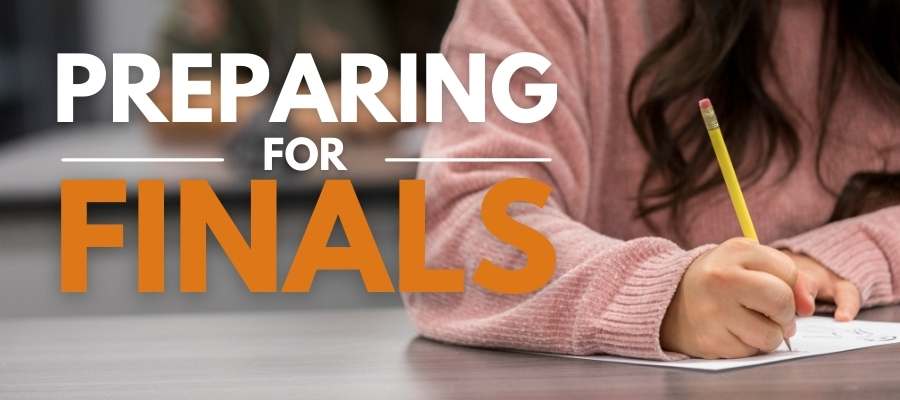
By: Melanie Bryant
It’s time again to prepare for finals! At Laurus College, students are assigned only one class per five-week term. This allows students to fully immerse themselves in the course material without being distracted by multiple classes at the same time. It also means class finals are every five weeks!
You might be gearing up to take a medical terminology test for Medical Billing and Coding, finalize a 3d model for the Digital Arts and Computer Animation program, or editing a video for the new Audio Video Production program. No matter which program you’re taking, preparing for finals can be a stressful time for a student. I’m here to give you some tips and tricks to help prepare for finals and be successful!
Create a Study Room

Creating a study room can be a daunting task. Studying for a test or working on an assignment requires a lot of effort. Even if you do the majority of your studying on a computer, the right study room can help boost your productivity. The best study room will help you maximize your efforts without distracting you. I wrote a post on exactly this topic a few months ago. Read about creating a study room to help you prepare for finals!
Get All the Information to Prepare for Finals
Before you can feel confident that you’ve completed your project, studied for your test, or readied yourself for that presentation, you need to know all the information. Clarify with your instructor what the instructions are for your final.
- Re-read any written information
- Check the assignment information on MyLaurus Portal
- Ask your instructor if anything is not clear
Use Study Aids
Once you’ve created a space you can work in and you have all the information for your final, it’s time to get to work. If your final is test-based, you’ll want to be sure to study the information that will be on the test. Here is a list of some effective study techniques based on a 2013 study (Dunlosky, et al., 2013)
Elaborative Interrogation

Elaborative interrogation is a technique where a student can add additional information to a fact in order to promote learning. Elaborating on an idea helps to encode information as an experience rather than a fact (Willoughby & Wood, 1994). Encoding information as experiences is the best way to turn information from something you memorized into something you learned.
- Take a fact that is part of your subject matter
Tachycardia is the term for an abnormal condition of a fast heart. - Ask yourself why?
Why is the term for an abnormal condition of a fast heart Tachycardia? - Answer the question:
Because the suffix -ia means “abnormal condition”, the prefix Tachy- means fast and the word root cardi means heart!
Elaborative interrogation techniques are great because they require no additional material, are easy to prepare, and can be used with any type of fact. Studies show this technique is better used for those with higher levels of subject knowledge and is also more effective with an instructor present to give meaningful feedback (Dunlosky et al., 2013). Still, it can be very effective as a solo study technique as long as you check your work afterward!
Self-Explanation
Self-explanation is a technique where a student is given a problem and discusses the steps that would be necessary to complete the problem. This technique requires students to explain their thought processes while solving problems in the subject domain. Similar to elaborative interrogation, this helps students to cement knowledge as an experience rather than a simple fact (Chamberland & Mamede, 2015). It also helps students discover gaps in their learning if they are unable to describe steps or the purpose of the step.
Similar to elaborative interrogation, self-explanation techniques allow the student to practice knowledge and review learning on their own without a lot of additional materials. Also like elaborative interrogation, it is best used with an instructor or a partner who can help provide meaningful feedback. Self-explanation is especially useful with project-based, practical application type finals such as building websites or troubleshooting IT issues.
Practice Testing

Numerous studies are showing that practice tests can greatly improve the recall of students for final exams (Dunlosky et al., 2013). In addition, some research shows that practice tests can help alleviate test anxiety on the final exam (Walsh, 2020). Practice tests are useful to prepare for finals in wide variety of knowledge domains and are often best used for memory-based type knowledge.
Practice testing can be a little more difficult than self-explanation or elaborative interrogation because it does require some materials. Ask your instructor if they can provide you with a practice test before the final exam or if they can give you some examples of the type of questions that will be on the exam. You can also effectively self-test using techniques such as flashcards or the Cornell note-taking system.
Set a Study Schedule to Prepare for Finals
When and how long you study can be as important as what you study. Research has shown there are two important factors when it comes to the length and intervals of study sessions.
Distributed Practice
Distributing learning over time in short sessions is more effective than cramming for long periods (Dunlosky et al., 2013). Reviewing the material after some time has elapsed allows better encoding of material as an experience rather than a pure fact. Similar to lifting weights, your brain needs time to grow in between learning new material.
According to Kennedy, the learning process using distributed practice should be Short term retention → spacing → retrieval → long-term retention.
How long should the spacing be?
Longer intervals seem to produce better results but the answer also depends on how long the learner wants to retain the information (Dunlosky et al., 2013). According to Dr. Sean Kang: “the optimal gap before having a review session is about 10 to 30 percent of the retention interval” (Francisco, 2019). Therefore if you learned something a week before you need it on a test, you’ll want to wait about a day before reviewing it.
As a general rule, prepare for finals by scheduling shorter sessions more often to study material you know will be important. Work with your instructor to determine what you should review during the term so you won’t be as rushed during finals week!
Interleaved Practice

Rather than focusing on just one topic at a time, studies have shown it can be helpful to switch between topics (Rohrer & Taylor, 2010). Connecting two related items in the brain helps promote learning. Interleaved practice promotes creative thinking by allowing students to compare different types of problems (Rohrer & Taylor, 2010). Consider studying different topics during the spacing of distributed practice. That way you are always utilizing your study time effectively!
Ask for Help
It is always a good idea to get in touch with your instructor to ask for feedback on your project or study techniques. The instructors at Laurus College are always ready and willing to offer advice on your progress. In addition, Laurus College students can utilize the Peer Mentor program which puts students in touch with mentors and tutors that can help them succeed in their classes. Students can also visit our weekly Tutoring Club every Thursday. Don’t be shy about using the resources! Contact Student Services for more information.
Works Cited
Chamberland, M., & Mamede, S. (2015). Self-explanation, an instructional strategy to foster clinical reasoning in medical students. Health Professions Education, 1(1), 24-33.
Dunlosky, J., Rawson, K. A., Marsh, E. J., Nathan, M. J., & Willingham, D. T. (2013). Improving students’ learning with effective learning techniques: Promising directions from cognitive and educational psychology. Psychological Science in the Public Interest, 14(1), 4-58.
Francisco, A. (2019, May 9). Ask the Cognitive Scientist: Distributed Practice. Digital Promise. https://digitalpromise.org/2019/05/08/ask-the-cognitive-scientist-distributed-practice/.
Kennedy, L. (2019). 7 Effective Ways to Use Distributed Practice at Your School. Prodigy Education. https://www.prodigygame.com/main-en/blog/distributed-practice/.
Taylor, K., & Rohrer, D. (2010). The effects of interleaved practice. Applied Cognitive Psychology, 24(6), 837-848.
Walsh, J. (2020, January 28). Why You Should Take Practice Tests Before an Exam: Test Prep. Peterson’s. https://www.petersons.com/blog/why-you-should-take-practice-tests-before-an-exam/.
Willoughby, T., & Wood, E. (1994). Elaborative interrogation examined at encoding and retrieval. Learning and Instruction, 4(2), 139-149.
